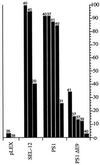Assessment of normal and mutant human presenilin function in Caenorhabditis elegans
- PMID: 8962160
- PMCID: PMC26241
- DOI: 10.1073/pnas.93.25.14940
Assessment of normal and mutant human presenilin function in Caenorhabditis elegans
Abstract
We provide evidence that normal human presenilins can substitute for Caenorhabditis elegans SEL-12 protein in functional assays in vivo. In addition, six familial Alzheimer disease-linked mutant human presenilins were tested and found to have reduced ability to rescue the sel-12 mutant phenotype, suggesting that they have lower than normal presenilin activity. A human presenilin 1 deletion variant that fails to be proteolytically processed and a mutant SEL-12 protein that lacks the C terminus display considerable activity in this assay, suggesting that neither presenilin proteolysis nor the C terminus is absolutely required for normal presenilin function. We also show that sel-12 is expressed in most neural and nonneural cell types in all developmental stages. The reduced activity of mutant presenilins and as yet unknown gain-of-function properties may be a contributing factor in the development of Alzheimer disease.
Figures



References
-
- Clark R F, Cruts M, Korenblat K M, He C, Talbot C, Van Broeckhaven C, Goate A M. Human Mol Genet. 1995;4:1347–1354. - PubMed
-
- Levy-Lahad E, Wysman E M, Nemens E, Anderson L, Goddard K A B, Weber J L, Bird T D, Schellenberg G D. Science. 1995;269:973–977. - PubMed
-
- Rogaev E I, Sherrington R, Rogaeva E A, Levesque G, Ikeda M, et al. Nature (London) 1995;376:775–778. - PubMed
-
- Sherrington R, Rogaev E I, Liang Y, Rogaeva E A, Levesque G, et al. Nature (London) 1995;375:754–760. - PubMed
Publication types
MeSH terms
Substances
Grants and funding
LinkOut - more resources
Full Text Sources
Other Literature Sources
Research Materials

